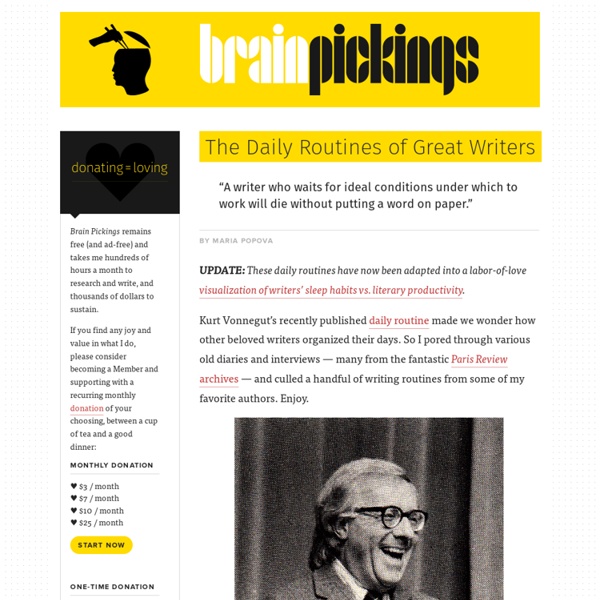REVEALING YOUR HERO'S WOUND: Good Will Hunting
At the beginning of your screenplay, your hero should be in a state of inertia — settling for a life that may be emotionally safe and tolerable, but that lacks passion, risk and fulfillment. Her life might be filled with activity and even give the illusion that she’s striving for something, but all this effort is ultimately going nowhere. In other words, your hero should be stuck. The reason for all this spinning in place is that the hero is living in his or her identity — the emotional armor we all carry to protect us from our deepest fears.
Kurt Vonnegut's Daily Routine
by Maria Popova “In an unmoored life like mine, sleep and hunger and work arrange themselves to suit themselves, without consulting me.” As a lover of letters and of all things Kurt Vonnegut, I spent months eagerly awaiting Kurt Vonnegut: Letters (public library), which has finally arrived and is just as fantastic as I’d come to expect. What makes the anthology particularly sublime is that strange, endearing way in which so much of what Vonnegut wrote about to his friends, family, editors, and critics appears at first glance mundane but somehow peels away at the very fabric of his character and reveals the most tender boundaries of his soul.
Famous Writers on the Creative Benefits of Keeping a Diary
by Maria Popova Reflections on the value of recording our inner lives from Woolf, Thoreau, Sontag, Emerson, Nin, Plath, and more. “You want to write, you need to keep an honest, unpublishable journal that nobody reads, nobody but you,” Madeleine L’Engle counseled in her advice to aspiring writers.
Neil Gaiman's 8 Rules of Writing
By Maria Popova In the winter of 2010, inspired by Elmore Leonard’s 10 rules of writing published in The New York Times nearly a decade earlier, The Guardian reached out to some of today’s most celebrated authors and asked them to each offer his or her commandments. After Zadie Smith’s 10 rules of writing, here come 8 from the one and only Neil Gaiman: WritePut one word after another. Find the right word, put it down.Finish what you’re writing.
Kurt Vonnegut term paper assignment from the Iowa Writers’ Workshop
Buck Squibb. Suzanne McConnell, one of Kurt Vonnegut’s students in his “Form of Fiction” course at the Iowa Writers’ Workshop, saved this assignment, explaining that Vonnegut “wrote his course assignments in the form of letters, as a way of speaking personally to each member of the class.” The result is part assignment, part letter, part guide to writing and life. This assignment is reprinted from Kurt Vonnegut: Letters, edited by Dan Wakefield, out now from Delacorte Press. This course began as Form and Theory of Fiction, became Form of Fiction, then Form and Texture of Fiction, then Surface Criticism, or How to Talk out of the Corner of Your Mouth Like a Real Tough Pro. It will probably be Animal Husbandry 108 by the time Black February rolls around.
Famous Writers’ Sleep Habits vs. Literary Productivity, Visualized
by Maria Popova The early bird gets the Pulitzer … sort of. “In both writing and sleeping,” Stephen King observed in his excellent meditation on the art of “creative sleep” and wakeful dreaming, “we learn to be physically still at the same time we are encouraging our minds to unlock from the humdrum rational thinking of our daytime lives.”
The Nature of Fun: David Foster Wallace on Why Writers Write
by Maria Popova “Fiction becomes a weird way to countenance yourself and to tell the truth instead of being a way to escape yourself or present yourself in a way you figure you will be maximally likable.” On the heels of the highly anticipated new David Foster Wallace biography comes Both Flesh and Not: Essays (public library) — a collection spanning twenty years of Wallace’s nonfiction writing on subjects as wide-ranging as math, Borges, democracy, the U.S. Open, and the entire spectrum of human experience in between. Among the anthology’s finest is an essay titled “The Nature of the Fun” — a meditation on why writers write, encrusted in Wallace’s signature blend of self-conscious despondency, even more self-conscious optimism, and overwhelming self-awareness. It was originally published in 1998 in Fiction Writer and also included in the wonderful 1998 anthology Why I Write: Thoughts on the Craft of Fiction.
Mr. Carpenter's Slaughterhouse-Five page
Kurt Vonnegut (Wikipedia) Slaughterhouse-Five (Wikipedia) Slaughterhouse-Five (Sparknotes)
Creation: Ancient Indian Origin Myths, Brought to Life in a Breathtaking Illustrated Cosmogony
by Maria Popova Consummate visual storytelling about life, death, the rhythms of time, and the beginning of art. “We don’t need to credit an all-seeing God with the creation of life and matter,” Douglas Rushkoff wrote in contemplating consciousness, “to suspect that something wonderfully strange is going on in the dimension we call reality.” And we don’t have to believe in such a god to appreciate the beautiful and imaginative ways in which the origin myths of the world’s various spiritual traditions capture this wonderful strangeness — from our earliest depictions of the universe to the marvelous mythic creatures that populate our legends.



